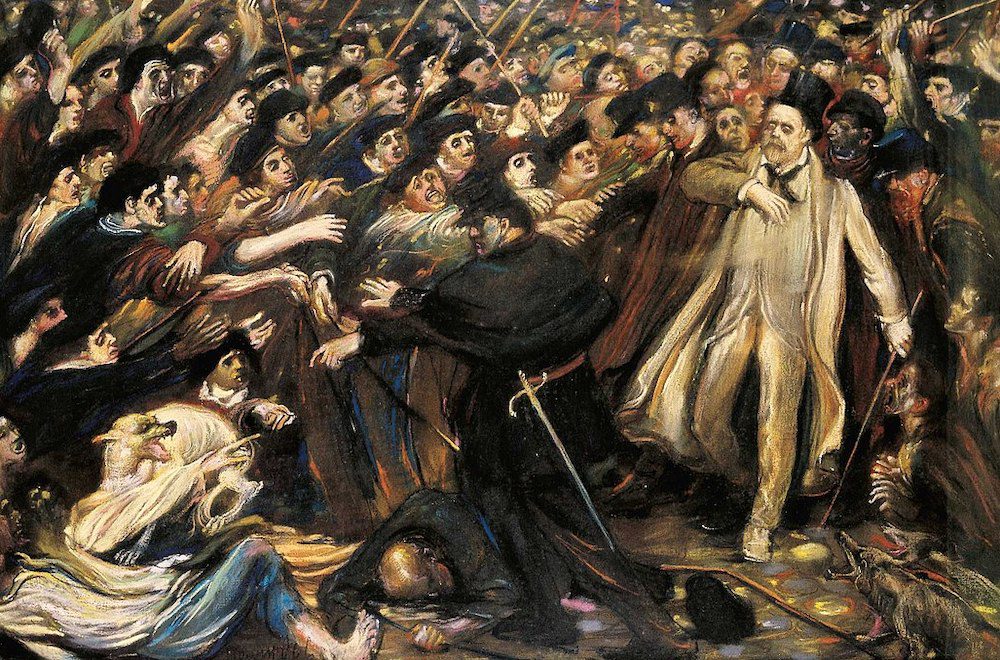The Killing of George Floyd is America’s Dreyfus Affair

Culture war is often derided as an American innovation, but as with so many things, the French got there first. From 1897 to 1899, France was torn apart by the arrest and trial of Alfred Dreyfus, a Jewish staff officer who was wrongly accused of spying for the Germans. Now a minor historical footnote, the Dreyfus Affair was once an all-consuming controversy that divided a country and captivated politicians, journalists, and intellectuals across Europe.
Historical analogies can be crude and imprecise, but there are some irresistible parallels between Dreyfus’s ordeal and the eruptions that followed the killing of George Floyd by a Minneapolis police officer. The United States finds itself in the position of France, a declining power that still has immense cultural sway. Our domestic culture war has gone global, inspiring protests as far afield as Dublin, Berlin, and Mexico City, just as foreign observers once obsessed over the spectacle of France at war with itself.
But the most striking parallel is the depth and intensity of the cultural animosities on both sides, who are not fighting over policy proposals but profoundly different political visions. In The Proud Tower, Barbara Tuchman writes that Dreyfus, never a particularly notable personality to begin with, became an “abstraction” to his supporters and detractors. She summarized the stakes of the Affair thusly:
Each side fought for an idea, its idea of France: one the France of Counter-Revolution, the other the France of 1789, one for its last chance to arrest progressive social tendencies and restore the old values; the other to cleanse the honor of the Republic and preserve it from the clutches of reaction.
It is hard to think of a more apt comparison to the current moment. The language of existential conflict was mainstreamed on the American right by the 2016 election. A now-infamous essay, “The Flight 93 Election,” compared voting for Donald Trump to a desperate attempt to retake a hijacked plane from the 9/11 terrorists. On the left, the incremental liberalism of the Obama administration has given way to something more radical, a thoroughgoing critique of American institutions and history that suggests—and sometimes says outright—that revolutionary change is the only path forward. From health care, where plans for universal coverage have supplanted the modest reformism of Obamacare, to the American War for Independence, which has been reimagined by The New York Times as a struggle to preserve slavery, the trend is unmistakable.
The killing of George Floyd has thrown this existential conflict into stark relief. On the left, the slogan du jour is “Defund the Police,” a call to action that would have been dismissed as crankish or absurd just a few years ago (indeed, a common complaint prior to Floyd’s death was that minority communities suffer from a toxic combination of intermittent, state-sanctioned brutality and under-policing). But abolishing police departments isn’t a platform—it’s a provocation. There could be no peace between the France of the Counter-Revolution and the France of 1789, just as there is no reconciling conservatives who still revere America’s history and institutions and a newly ascendant left that questions their very legitimacy. The liberalism of yesteryear, which emphasized fealty to the country’s ideals while pressing the urgency of reform, seems antiquated and obsolete.
In 1897, the Affair was fueled by the popular press, creating a feverish environment that anticipated our own obsession with social media. The claims and counter-claims of the Dreyfusards and their opponents were amplified until the institutional legitimacy of the French army, which compounded its wrongful conviction of Dreyfus by refusing to admit error, was on trial.
“It was the press which created the Affair and made truce impossible,” writes Tuchman. From reactionary monarchists to revolutionary anarchists, every fringe political faction had its own public bullhorn. This journalistic free-for-all has since been replaced by the insanity-inducing algorithms of Twitter, Facebook, and Instagram. Outrageous video clips and inflammatory quotes, often edited or ripped out of context, are circulated online in the same manner that Frenchmen once passed around broadsheets and editorials.
There is one final parallel between the Dreyfus Affair and our current moment that is particularly frightening. “Give me combat” was the battle cry of a prominent Dreyfusard, a sentiment surely felt by many quarantine-weary Americans, who have been primed for confrontation by a toxic combination of social media, unevenly distributed prosperity, and a certain disenchantment with bloodless late-period liberalism. A Frenchman of La Belle Epoque, another era characterized by inequality and ideological upheaval, would have understood our predicament.
But that glamorous and uneasy period eventually came to an end on the killing fields of Flanders. In 1914, the French Army marched to war in its traditional red trousers, confident that Plan 17, a mad dash into the teeth of German fortifications in Alsace-Lorraine, would carry the day. The terrible slaughter that followed was far more consequential than any of the petty disputes of the pre-war era. Dreyfus was a harbinger of an impending catastrophe. It is hard to escape the feeling that our own culture war is merely a prelude to something far more destructive.
Will Collins is an English teacher who lives and works in Eger, Hungary.